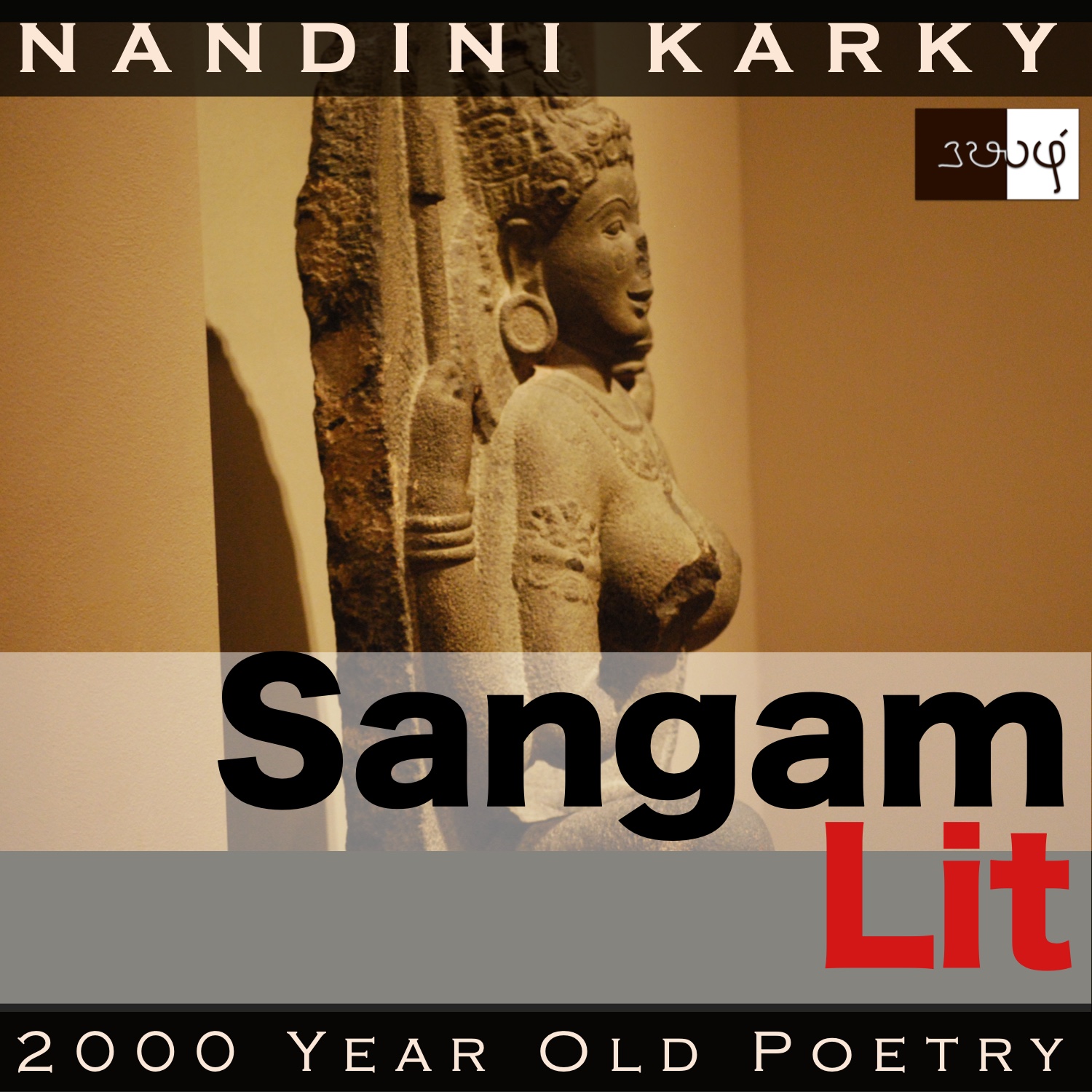Podcast: Play in new window | Download
Subscribe: Apple Podcasts | Spotify | Amazon Music | Android | iHeartRadio | TuneIn | RSS | More

In this episode, we hear the laments and lore around a woman jilted in love, as depicted in Sangam Literary work, Natrinai 216, penned by Madurai Maruthan Ilanaakanaar. Set in the agricultural landscape of ‘Marutham’, the verse speaks in the voice of the courtesan to her friends, so as to convey a message to the lady through the lady’s friends, listening nearby.
துனி தீர் கூட்டமொடு துன்னார் ஆயினும்,
இனிதே, காணுநர்க் காண்புழி வாழ்தல்;
கண்ணுறு விழுமம் கை போல் உதவி,
நம் உறு துயரம் களையார்ஆயினும்,
இன்னாதுஅன்றே, அவர் இல் ஊரே;
எரி மருள் வேங்கைக் கடவுள் காக்கும்
குருகு ஆர் கழனியின் இதணத்து ஆங்கண்,
ஏதிலாளன் கவலை கவற்ற,
ஒரு முலை அறுத்த திருமாவுண்ணிக்
கேட்டோர் அனையராயினும்,
வேட்டோர் அல்லது, பிறர் இன்னாரே.
The verse begins with the words ‘துனி தீர்’ meaning ‘solving a couple’s tiff’ and thereby, places it in the agricultural landscape, whose central theme is predominantly, a ‘love-quarrel’. The word ‘காணுநர்’ implies ‘he who is pleasing to the eyes’. ‘கண்ணுறு விழுமம் கை போல் உதவி’ is full of vibrant action as it brings to the mind, the instantaneous movement of the hand rushing to the aid of the eye when something falls on it. Yellow flowers of the Indian Kino tree are described poetically as ‘எரி மருள்’ meaning ‘flame-like’. Seeing ‘ஒரு முலை அறுத்த திருமாவுண்ணி’, which means ‘Thirumavunni, who chopped off one of her breasts’, anyone even slightly familiar with the epic of Silapathikaram, a post-Sangam literary work would recognise the connection instantly. More on that in a moment! Let’s delve into the meaning behind these glimpses.
The man and lady had been leading a happy married life when the man took to keeping the company of a courtesan. The man and the courtesan get into a fight and he leaves her for a while. One day, seeing the lady’s friends walk by her place, the courtesan pretending not to notice them, as if talking to her friends, the female dancer and the male singer, says, “Even though he doesn’t resolve the tiff between us and unite with me again, it is sweet to live in a place where I can see the man who is pleasing to my eyes. Unlike the hand that rushes to the eye when trouble befalls it, he may be a person who does not slay my sorrow. Even as that may be, a village without him in it, is worthless. Near the ‘vengai’ tree with fire-like flowers, protected by gods, in a field resounding with the uproar of birds, on a raised platform, ‘thirumavunni’ chopped off one of her breasts, filled with despair at being abandoned by a stranger, whom she was in love with. Many may have listened to this pitiful tale but only the one who loved the lady would be moved by it. Likewise, anyone other than he who I desire, are foes indeed!” With these words, the courtesan is declaring to the lady’s friends that the man is close to her heart and that she has the power to win him back, hoping that message reaches the lady, so as to increase her jealousy and thereby, her ire towards the man.
Now, for the details within the song! The courtesan declares that no matter if the lord doesn’t resolve their issues and come back to her, she would still be happy just living in the place where he lives, casting her eyes on him now and then. Then, comes that simile that we saw earlier about a hand rushing to the aid of a troubled eye. It’s something of an ‘inverse simile’ here, for the courtesan says even if the man doesn’t rush to her like that hand, she cannot bear to live in a town without him. At that point, she mentions the story of a woman called ‘Thirumavunni’, to equate her own state to that of ‘ Thirumavunni’, abandoned by her lover. She adds that many may have listened to the tale but the one who could change that character’s life was the one whom she loved. Likewise, many may listen to her laments, but only the lord, whom she loved, could resolve her anguish. The thought she wishes to sow in the mind of the lady, who will eventually receive the message, is that her quarrel with the man is temporary and that with her faith, she will win him back!
Returning to the tale of Thirumavunni, she is a woman who might have been a contemporary or a character from ancient folklore. This lady had met and fallen in love with a stranger. But, the stranger refuses to acknowledge their relationship. So, in front of elders and others, on a raised platform, in a field full of birds, near a ‘vengai’ tree with flame-like flowers, she calls god as witness. When god fails to appear, in order to prove the truth in her words, she chops off one of her breasts. While this may be a shocking story to those who are not familiar with Silapathikaram, those who have heard it will instantly see ‘Kannagi’ in this ‘Thirumavunni’. The lady depicted in this song pre-dates the era of ‘Silapathikaram’ and could be said to be an inspiration for that vital scene in the epic. Just the way we have seen predecessors of ‘Thirukkural’ in some of these poems, this story could have been the ‘predecessor’ of that disquieting scene in ‘Silapathikaram’. Perhaps, all possible stories are always echoing softly in the air, just waiting for the inspired artist to weave magic out of it!




The story of Thirumavunni reminds me of a similar scene from the movie ‘Angadi Theru’ where a girl jumps off from the store to prove her love.
Interesting connection, Subha. It’s fascinating when we can link past perspectives to present perceptions.